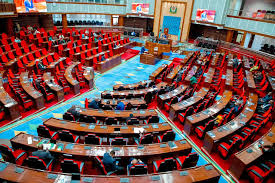The Tanzanian National Assembly has approved the Agreement for the Establishment of the Africa Finance Corporation (AFC), a move expected to open doors for long-term investment financing aimed at accelerating the country’s infrastructure, industrial growth, and overall economic development.
Presenting the agreement to Parliament, Finance Minister Dr. Mwigulu Nchemba highlighted that Tanzania’s ratification will enable local financial institutions and the private sector to access much-needed AFC funding. This financial support is intended to cover lending and refinancing across a variety of economic sectors.
Joining the AFC, Dr. Mwigulu explained, will help increase national income, create employment opportunities, and improve circulation of both local and foreign currency in Tanzania’s economy. “Institutions accessing these funds will be able to employ more people, thus creating jobs and boosting income,” he said.
He further noted that the AFC provides expert advisory services on planning, financing, and implementing development projects, which is an added advantage for Tanzania. The corporation boasts a strong credit rating of A3 from Moody’s, making it attractive to investors interested in supporting development projects in the country.
To safeguard local financial institutions currently offering short- and medium-term loans, Dr. Mwigulu proposed a reservation within the agreement ensuring AFC loans focus on long-term and developmental projects like infrastructure, strategic investments, and industrial growth.
The Africa Finance Corporation, established in 2007 with headquarters in Lagos, Nigeria, aims to drive economic growth and industrial development across the continent. As of March 2025, 44 African countries have joined AFC—28 as regular members and 16 as shareholder members.
By the end of 2024, the AFC reported total assets of $14.4 billion and equity worth $3.9 billion, invested across multiple sectors including infrastructure, energy, transportation, communications, and industry in 34 member countries. Since inception, AFC has financed projects valued at $14.79 billion.
Ownership of AFC is shared between the public and private sectors. The Central Bank of Nigeria holds 59% of shares on behalf of the public sector, while 41% belongs to private shareholders, including the African Development Bank and Africa Reinsurance Corporation.
Dr. Mwigulu also revealed that Tanzania had been invited to join the AFC since 2021 through the Ministry of Foreign Affairs and East African Cooperation. Prior to membership, some Tanzanian investors were unable to access AFC loans.
He reassured the House that joining as a regular member means the Tanzanian government will not be required to guarantee loans issued by the AFC to private companies. However, guarantees may be provided for loans to government institutions or public-private partnership (PPP) projects, in accordance with existing laws.
While presenting the Parliamentary Standing Committee on Budget’s report, committee member Bahati Ndingo urged caution concerning some provisions of the agreement related to immunities and tax exemptions for the AFC and its employees. She recommended adding appropriate reservations to Articles 7 to 15 of the agreement to prevent conflicts with Tanzania’s national laws.
“The government should learn from countries like Liberia, Ethiopia, and Somalia, which ratified the agreement with similar reservations,” Ndingo said.
The committee also called on the government to thoroughly assess the scale and nature of organizations it partners with under such agreements to ensure that preferential treatments align with Tanzania’s legal framework and national interests.
